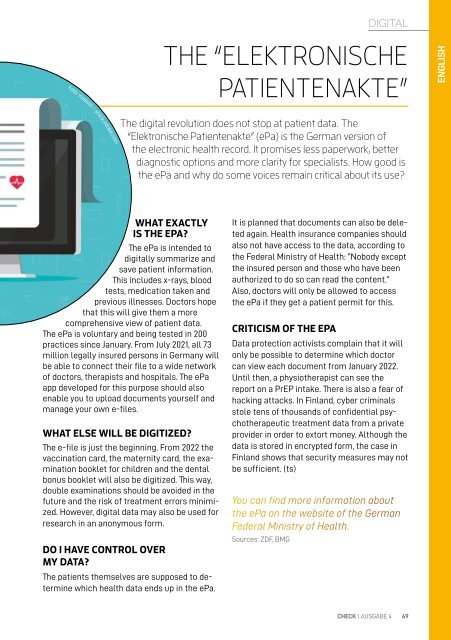CHECK Berlin #4
Erfolgreiche ePaper selbst erstellen
Machen Sie aus Ihren PDF Publikationen ein blätterbares Flipbook mit unserer einzigartigen Google optimierten e-Paper Software.
DIGITAL<br />
THE “ELEKTRONISCHE<br />
PATIENTENAKTE”<br />
ENGLISH<br />
Foto: vladwel / stock.adobe.com<br />
The digital revolution does not stop at patient data. The<br />
“Elektronische Patientenakte” (ePa) is the German version of<br />
the electronic health record. It promises less paperwork, better<br />
diagnostic options and more clarity for specialists. How good is<br />
the ePa and why do some voices remain critical about its use?<br />
WHAT EXACTLY<br />
IS THE EPA?<br />
The ePa is intended to<br />
digitally summarize and<br />
save patient information.<br />
This includes x-rays, blood<br />
tests, medication taken and<br />
previous illnesses. Doctors hope<br />
that this will give them a more<br />
comprehensive view of patient data.<br />
The ePa is voluntary and being tested in 200<br />
practices since January. From July 2021, all 73<br />
million legally insured persons in Germany will<br />
be able to connect their file to a wide network<br />
of doctors, therapists and hospitals. The ePa<br />
app developed for this purpose should also<br />
enable you to upload documents yourself and<br />
manage your own e-files.<br />
WHAT ELSE WILL BE DIGITIZED?<br />
The e-file is just the beginning. From 2022 the<br />
vaccination card, the maternity card, the examination<br />
booklet for children and the dental<br />
bonus booklet will also be digitized. This way,<br />
double examinations should be avoided in the<br />
future and the risk of treatment errors minimized.<br />
However, digital data may also be used for<br />
research in an anonymous form.<br />
DO I HAVE CONTROL OVER<br />
MY DATA?<br />
The patients themselves are supposed to determine<br />
which health data ends up in the ePa.<br />
It is planned that documents can also be deleted<br />
again. Health insurance companies should<br />
also not have access to the data, according to<br />
the Federal Ministry of Health: “Nobody except<br />
the insured person and those who have been<br />
authorized to do so can read the content.”<br />
Also, doctors will only be allowed to access<br />
the ePa if they get a patient permit for this.<br />
CRITICISM OF THE EPA<br />
Data protection activists complain that it will<br />
only be possible to determine which doctor<br />
can view each document from January 2022.<br />
Until then, a physiotherapist can see the<br />
report on a PrEP intake. There is also a fear of<br />
hacking attacks. In Finland, cyber criminals<br />
stole tens of thousands of confidential psychotherapeutic<br />
treatment data from a private<br />
provider in order to extort money. Although the<br />
data is stored in encrypted form, the case in<br />
Finland shows that security measures may not<br />
be sufficient. (ts)<br />
You can find more information about<br />
the ePa on the website of the German<br />
Federal Ministry of Health.<br />
Sources: ZDF, BMG<br />
<strong>CHECK</strong> | AUSGABE 4<br />
69


















